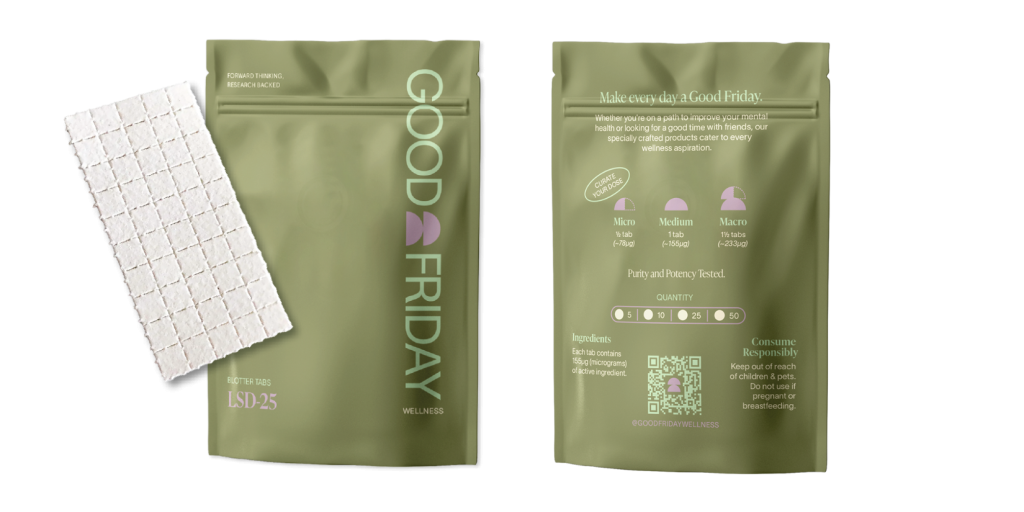We’re back — 25% off site-wide and free shipping over $150! Get ready for Christmas 🎄

LSD blotter tabs, small pieces of paper soaked in LSD (lysergic acid diethylamide), have long been associated with the counterculture movements of the 1960s. Initially embraced for their mind-expanding properties, LSD and blotter tabs gained notoriety as symbols of rebellion and freedom. However, recent scientific research is unveiling a new narrative, positioning LSD as a potential ally in the quest for mental health and well-being.
In Canada, the conversation around psychedelics is evolving rapidly. As public perception shifts and scientific research expands, there is a growing interest in the therapeutic potential of substances like LSD. This article delves into the science behind LSD blotter tabs, exploring how it works and its promising implications for mental health.
Blotter tabs are paper squares typically infused with LSD, a potent psychedelic compound. Each tab contains a microdose of LSD, designed to be placed on the tongue and absorbed sublingually. The tabs are often decorated with colorful and intricate designs, adding a visual appeal to their practical purpose.
LSD blotter tabs primarily exert their effects by interacting with serotonin receptors in the brain. Serotonin is a neurotransmitter that plays a crucial role in mood regulation, perception, and cognition. LSD binds to the 5-HT2A receptor, leading to altered sensory perception, enhanced introspection, and vivid visual experiences.
Research using advanced imaging techniques like functional MRI (fMRI) has shown that LSD blotter tabs increase connectivity between different brain regions. This heightened connectivity results in a more integrated brain network, which can lead to the dissolution of rigid thought patterns and an increased sense of openness and creativity. A 2016 study published in the journal Current Biology revealed that LSD creates a “more unified brain,” enabling a state of higher consciousness and enhanced cognitive flexibility.
Recent studies suggest that LSD blotter tabs can have profound effects on mental health, particularly in treating conditions like depression and anxiety. By disrupting negative thought loops and promoting new perspectives, LSD can help patients break free from the grip of these debilitating conditions. A study conducted by Imperial College London in 2020 found that participants who received LSD-assisted therapy reported significant reductions in depressive symptoms lasting up to six months post-treatment.
LSD’s ability to enhance emotional processing and reduce fear responses has shown promise in treating post-traumatic stress disorder (PTSD). Patients often report a sense of emotional release and a newfound ability to confront and process traumatic memories during LSD-assisted therapy sessions. The Multidisciplinary Association for Psychedelic Studies (MAPS) has been at the forefront of researching LSD for PTSD, demonstrating its potential to facilitate profound healing experiences.
LSD blotter tabs have also been explored as a treatment for addiction. Their ability to promote introspection and enhance the perception of self-worth can be instrumental in helping individuals overcome substance abuse disorders. Studies have shown that a single dose of LSD can lead to significant reductions in alcohol and drug use. For example, a meta-analysis published in Journal of Psychopharmacology in 2012 highlighted that LSD significantly reduced alcohol misuse in patients compared to control groups.
Canada has been at the forefront of psychedelic research, with institutions like the University of Toronto and the Canadian Centre for Psychedelic Science leading the way. In a notable study, researchers at the University of British Columbia found that LSD blotter tabs could help alleviate symptoms of anxiety and depression in patients with life-threatening illnesses. This research supports the growing body of evidence that psychedelics can offer substantial mental health benefits.
One case that illustrates the potential of LSD therapy is that of a Canadian veteran suffering from severe PTSD. After conventional treatments failed, he participated in an LSD-assisted therapy trial. The therapy allowed him to process his traumatic experiences in a new light, leading to a significant reduction in his PTSD symptoms and an overall improvement in his quality of life.
The therapeutic use of LSD involves careful preparation and a controlled environment. Patients typically undergo several preparatory sessions with a trained therapist to establish trust and set intentions for the experience. This preparation phase is crucial for ensuring that the patient feels safe and supported throughout the process.
During an LSD session, patients are in a safe, supportive setting, often with soothing music and minimal distractions. The therapist guides the patient through the experience, helping them navigate any challenging emotions or insights that arise. Sessions typically last several hours, with the therapist providing continuous support.
Integration sessions are crucial for processing the insights gained during the LSD experience. These sessions help patients incorporate their new perspectives into their daily lives, fostering long-term mental health benefits. Integration work can involve therapy sessions, journaling, and developing new habits that align with the insights gained during the experience.
While the therapeutic potential of LSD is promising, it’s essential to approach its use with caution. LSD is a powerful substance, and its effects can be unpredictable. It’s crucial to use it under the guidance of trained professionals in a legal and controlled setting.
As of now, LSD remains a Schedule III controlled substance in Canada, meaning it is illegal for general use but allowed for scientific research under specific conditions. However, ongoing research and clinical trials are paving the way for a potential reclassification that could make LSD blotter tabs more accessible for therapeutic purposes.
The resurgence of interest in LSD and its potential benefits for mental health marks a significant shift in our understanding of psychedelics. As more research is conducted and the stigma surrounding these substances diminishes, we can expect to see a broader acceptance and integration of LSD blotter tabs into mainstream mental health treatments.
Institutions across Canada and globally are expanding their research efforts. The Canadian Centre for Psychedelic Science is launching several new studies to explore the long-term effects of LSD on mental health. Additionally, partnerships between universities and private research organizations are expected to accelerate the development of LSD-based therapies.
With growing evidence supporting the therapeutic benefits of LSD, policymakers in Canada are beginning to reconsider the legal status of psychedelics. Advocates are pushing for regulatory changes that would allow for the controlled use of LSD blotter tabs in clinical settings, potentially making them accessible to more Canadians in need.
The exploration of LSD and its potential benefits for mental health is a testament to the evolving landscape of psychiatric treatment. LSD blotter tabs, once a symbol of counterculture rebellion, are now at the forefront of scientific research aimed at unlocking new frontiers in mental health treatment. As we continue to explore the depths of the human mind, LSD may prove to be a valuable tool in our quest for mental well-being.
At GOOD FRIDAY, we are committed to harnessing the therapeutic potential of LSD. Our LSD 25 blotter tabs are crafted with precision to ensure safety and effectiveness. Experience the benefits of this groundbreaking research firsthand and take a step towards improved mental health. Visit our shop today to learn more and join us on this journey towards wellness and enlightenment.

Embracing Wellness as the Standard.
Can we email you our quick start guide and a discount on your first order?
Wellness Reimagined, Life Redefined.
We are excited to support your major wellness shifts with modest doses.
By submiting you agree to our privacy policy. Your information is safe with us and you can unsubscribe at any time.
Harmonize Your Health, Naturally.
Almost done! We’ve just sent you an email to confirm your address.